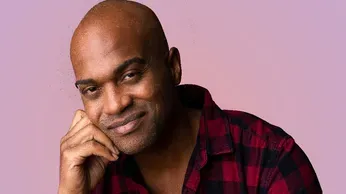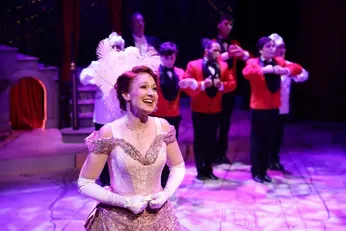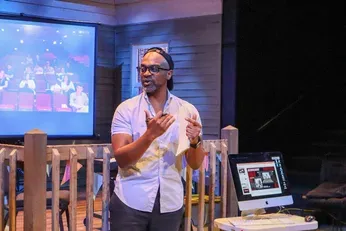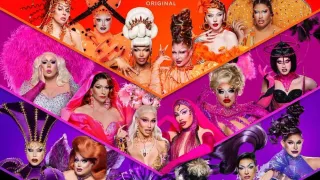
May 20
Maurice Emmanuel Parent Gives 'Hello, Dolly!' a 'New Sort of Crackle'
Kilian Melloy READ TIME: 6 MIN.
The musical "Hello, Dolly!" has captivated audiences – and especially gay audiences – since its debut in 1964, which featured direction and choreography by none other than Gower Champion. The songs are by Jerry Herman, and Michael Stewart's book adapts the Thornton Wilder play "The Matchmaker" (from 1954, but adapted by Wilder from his own 1938 play "The Merchant of Yonkers").
If you've seen the play – or the movie from 1969, starring Barbra Streisand and Walter Matthau – then you'll be familiar with the plot: The widowed Dolly Levi, a professional match-maker (one of her many services), sets out to set up the wealthy Horace Vandergelder with a wife... namely, herself. A zany cast of characters coalesces around this unlikely couple, including hat shop owner Irene Molloy and her employee, Minnie Fay; Vandergelder's slacking employees Cornelius and Barnaby; and Horace's niece, Ermengarde, who wants to marry her artist boyfriend, Ambrose, despite Vandergelder's objections. A fast-talking dynamo, Dolly creates chaos everywhere she goes, but with a cast of characters as colorful as this, her brand of chaos can't help but to result in a comedic kind of order and an eventual happy ending all around.
The beloved classic is set to run at the Lyric Stage Company from May 16 – June 22. It's just the sort of tonic that we need right now, director Maurice Emmanuel Parent tells EDGE.
"To prepare for directing the show, I re-watched the movie," Parent recalls. "You know, Barbra Streisand, directed by – oh, boy! – Gene Kelly, and Michael Kidd did the choreography. Around 20 minutes into the show, around the musical number 'Put on Your Sunday Clothes,' I just started bawling. I realized I had not felt this joyful, free, and tapped into beauty since the election. I started thinking, 'Life doesn't have to be complete gloom and doom. It is not completely hopeless.'"
Moreover, the play was not as straightforward as Parent remembered. "When I accepted the offer to direct it, I was like, 'Yeah, I love "Hello, Dolly!" I love the music. We will honor the music. We will honor the grandeur.' But as soon as I re-read it, and really read it, this is a very progressive story in many ways."
That said, Parent isn't interested in doing anything that would overtly modernize the show.
"I'm definitely not a fan of thinking that 'Hello, Dolly!' should be reimagined," the director mused. "I feel that classic pieces are classic for a reason. Our job is to look at them with an understanding of when they were written, and what they were saying, and then honor that.
"But I am a fan of saying, 'What if we did it knowing that just doing it in 2025, it will have a different flavor?'" Parent adds. "It will have a new sort of crackle. So, both can exist."
No doubt they will. Read on to find out more about why "Hello, Dolly!" remains a favorite with gay audiences, why Parent cast Boston stage favorite Aimee Doherty in the title role, and how he's thinking about filling Gower Champion's still-huge dance shoes together with the show's choreographer, Ilyse Robbins.

Source: Mark S. Howard
EDGE: It's very unusual, even now, for a stage or a film story to center on a middle-aged woman. Is that part of the enduring charm and relevance of this play?
Maurice Emmanuel Parent: Yeah, I think that's part of its endurance. I feel sometimes with things like "Hello, Dolly!," people just think, "I've seen it a thousand times," or put in a category of good old feel-good musicals, and don't think much more about it. And sure, it is a feel-good musical. The purpose of it is to make people leave feeling good. But what happens a lot of times [is that] so much richness and deepness may have been forgotten. I played Horace Vandergelder in high school; 17-year-old Maurice was not really thinking about the social commentary, or the idea that women are told that you get married once and that's your last chance at love, so you should just be satisfied with what life has to offer after that. I wasn't aware of these things. It's like you said, a middle-aged woman who realizes that she still has things to do, and potential for love. But then, also, she's a businesswoman.
And Irene Molloy is also a widow, and a businesswoman. What does she need to operate in the world, to make her business successful?
And then you have Horace Vandergelder, who's a widower. There's a lot of loss in the play. A lot of this story is about the resilience of the human spirit, and how even if society says, "It's over, you had your one love and you should just be complacent," it reminds you, "Don't let the parade pass you by. The parade of life is ongoing, and you have every right to join in at any point in your life."
EDGE: Is pushing back against those societal restrictions – especially in a way that's colorful, flamboyant, joyous and strong-willed – something that makes this play such a favorite of gay audiences?
Maurice Emmanuel Parent: These iconic female leads are so right for our community. We love a strong female lead, right? I know there's lots of theories around that; is it we connect with the idea that society wants to disempower you, and strong women like Dolly are smarter and craftier and stronger [than the] people that want to devalue her? I think queer people can identify with that, and that's a beautiful thing.
We also love aesthetics. I don't want to speak for the entirety of the queer community, but in general we tend to like beautiful things. We tend to like art and music, and life and love, and things like that. That's what this play's about; [Dolly] has a beautiful monologue about how everyone should enjoy the good things in life, and those are things that queer folks love. So much of our society has tried to tell us we don't deserve those [good things] – that's crap. This show's very much about everyone deserving beauty and art and life, and good food and good wine, and love, and all that kind of stuff.

EDGE: You've got Joshua Wolf Coleman as Vandergelder, Kristian Espiritu as Irene Molloy, Temma Beaudreau as Minnie Fay, Max Connor as Barnaby and Michael Jennings Mahoney as Cornelius, Joy Clark as Ernestina, Stephen Caliskan as Ambrose – and you've got Aimee Doherty playing Dolly, which is such a great choice. What are your conversations with Aimee like in terms of her portraying this character?
Maurice Emmanuel Parent: I love Aimee Doherty. Love her. We've done a whole bunch of shows together. We have some major talent in this community that would have been fabulous as Dolly; I could have cast the show 10 times over with 10 different Dollys, and it all would have been fabulous. It just was Amy's audition that showed me the way I want to tell this story.
It's her sense of play. Every time she did the audition scene was slightly different and crazy. The thing that excites me about the role is that I feel Dolly is someone who will [jump into a situation] with no plan but have the confidence that she can think on her feet well enough to make something happen. She doesn't know what it's going to be, but it's gonna be great. I love that feeling. It takes subtle things like that to make something that we know and love feel fresh, because you don't know what's going to happen next.
EDGE: Gower Champion was the original director and choreographer, so is it a little intimidating for you, and for Ilyse Robbins to have his ghost in the room, as it were?
Maurice Emmanuel Parent: I do not feel intimidated; I feel honored, because [his work] is well known and well respected, and this show is amazing. It's a gift that we're doing in a place like the Lyric. Gower Champion's "Hello Dolly," or the Bette Midler-led, or the Bernadette Peters-led "Hello, Dolly!"s were in these huge proscenium theaters with huge production budgets. Our version of it will be a different experience. It's going to feel more immersive, because the space is more intimate. There is no fourth wall.
My goal is to make people feel part of the parade. When you feel down and out, dress nice and smell the roses. That's what this show is, and that's what I'm excited about. Put on your Sunday clothes, and look cute, and enjoy life, because you're still alive.
"Hello, Dolly!" plays at the Lyric Stage Company May 16 – June 22. For tickets and more information, follow this link.
Kilian Melloy serves as EDGE Media Network's Associate Arts Editor and Staff Contributor. His professional memberships include the National Lesbian & Gay Journalists Association, the Boston Online Film Critics Association, The Gay and Lesbian Entertainment Critics Association, and the Boston Theater Critics Association's Elliot Norton Awards Committee.







